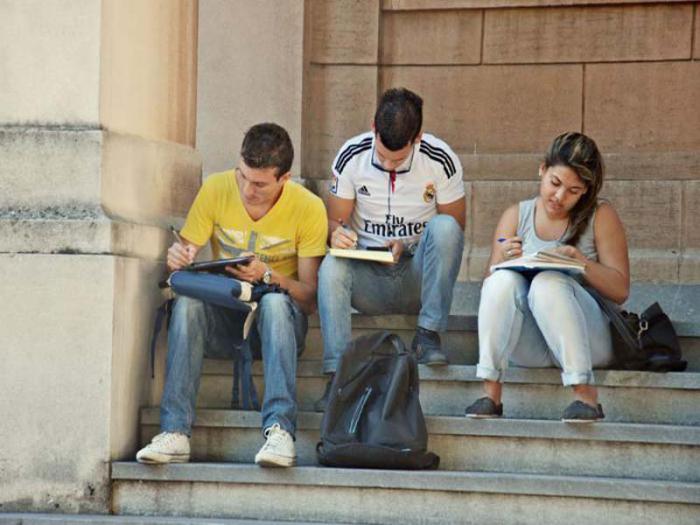The Revolution is already 56 years old and is just as young as it was at the beginning.From January 1, 2015 the Cuban Revolution began to experience a new point in its history, the same history we learn about in books, but which we have also experienced through the realization of its accomplishments.

In a time of the internet, cell phones and reggaeton but also Silvio and real life heroes, the Cuban youth is making its own way and facing the challenges of having been born in the Greater Antilles.
Sitting on the Havana Malecon, whether a self employed worker or part of a research team, or those leaving university classrooms or in the streets, young people talk about their expectations for their Revolution.
REVOLUTION AND REVOLUTION
“I was born in a very difficult year, 1989, and everything I have experienced in regards to health, culture, education, sports and social security, all of it, I owe to the Revolution,” said Liaena Hernández, a teacher at the Guantánamo Pedagogical School.
“Those of us who follow the work of Che believe that being a revolutionary goes far beyond the political party you may or may not be able to join, it is about an attitude toward life and humanity. The Comandante en Jefe´s (Fidel Castro) concept of Revolution also goes beyond politics, it is a motive, to live with a great amount of humanism, the sense not to remain static, to transform, change, evolve in accordance with the times, with the historical context in which you live,” emphasized Liaena.
For Idaliena Díaz, an Art Instructor also from Guantánamo, renovation is a form of progress, stating that it is the essence of revolutions, as well as acting in accordance with human principals, ethics, the responsibly that everyone can assume in regards to the most altruistic and noble values.
Both agree that, as they learned from Che, true revolutionaries have to be driven by great feelings of love and that it is not possible to create a genuine and profound work if it is not filled with this sentiment. “It must be present in everything we do for good,” they stated.
Meanwhile, in the grounds of the University of Havana, Nelson Aguiar, a Law student, sees the Revolution as a “miracle. It is the joy, the maintenance of a policy which Fidel has proposed since 1959, the materialization of which can be seen in the daily life and struggle of Cubans.”
THE PRESENT AND ITS CHALLENGES
There are new perspectives: the return ofGerardo, Ramón and Antonio, and the announcement of the reestablishment of diplomatic relations between Cuba and the United States mark a defining moment in Cuban history.
Nelaida Calleja, a fifth year Computer Sciences student, noted that people identify greatly with the aforementioned events, which have filled our daily life with inspiration and spirit, stating that currently the Revolution impresses a greater sense of belonging in all spaces we find ourselves, within which we must continually play a greater role.
“It is today’s youth that is responsible for maintaining our historical memory, because only in this way can we lead the social project which has been cultivated over all these years. We can not just be music and banality, we have the responsibility of doing things well, fighting for what we believe in, not allowing anyone to influence the essence of being Cuban, and not believing that the changes which have occurred over recent years will resolve all our problems alone.
“There are many external influences, but we must always maintain our essence, living our present, with the dangers and benefits of an era of new technologies, with the challenges which we are facing, challenges which are not the same as those of Cuba a few years ago. This is what we have to do, revolutionize within the Revolution, that is how we will guarantee the future,” Idaliena stated.
Nelson believes that regarding the announcement of the restoration of diplomatic relations with the United States the first thing we must to is thoroughly analyze Obama’s speech and understand what it really means, because U.S. government interests with respect to our country have not changed, although relations may benefit both parts.
For David Rodríguez, a fourth year accountancy student, it is an age of changes, an era of new opportunities, but without negotiating our principals.
“I hope these are times to achieve greater development in communications and new technologies, and access to these tools, a sphere where our generation makes an impact.”
Rafael Rosabal is 27, works at Habana Pizzas and is also a computer engineer for Softel. The issue of new technologies affects him directly; he hopes that we can advance in the development of our economy which has experienced many difficulties and has new obstacles to overcome. He says that self employment and cooperatives are definitely an alternative.
These conversations with Granma took place among ideas, dreams, aspirations and realities from personal perspectives. Each individual, in their own way and via different routes, arrived at an idea summarized by Liaena:
“As Fidel said, no one thinks that the hour of the revolutionaries has passed, that our time has passed. Current and future generations must assume new and more important tasks, new acts of heroism which only revolutionaries of this era can carry out, we cannot be in any place other than the vanguard of the Cuban youth,” she concluded.
Heroic acts are not only those in the pages of history books or those realized by men such as the Five. Heroic acts are also those which have been carried out by the people and which have brought us to where we are today, with the daily heroism for our homeland.















